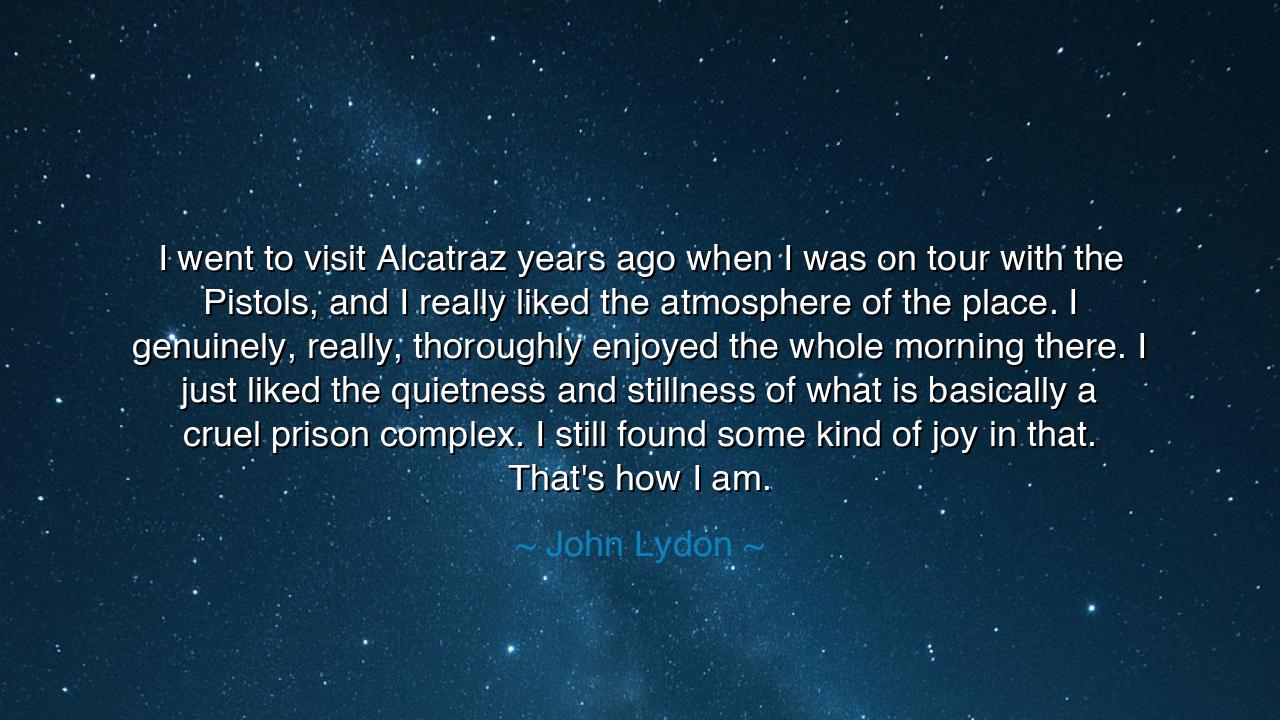
I went to visit Alcatraz years ago when I was on tour with the
I went to visit Alcatraz years ago when I was on tour with the Pistols, and I really liked the atmosphere of the place. I genuinely, really, thoroughly enjoyed the whole morning there. I just liked the quietness and stillness of what is basically a cruel prison complex. I still found some kind of joy in that. That's how I am.






In the quiet and seemingly oppressive places of the world, where most would see despair and suffering, there are those who, through the depth of their spirit, find something else—something unexpected, even joyful. John Lydon, the provocative figure known for his rebellious spirit and musical genius, speaks to this deeper truth when he says, "I went to visit Alcatraz years ago when I was on tour with the Pistols, and I really liked the atmosphere of the place. I genuinely, really, thoroughly enjoyed the whole morning there. I just liked the quietness and stillness of what is basically a cruel prison complex. I still found some kind of joy in that. That's how I am." In these words, Lydon reveals a profound capacity to find peace even in the most unlikely places, to see stillness and quietness where others see only harshness and confinement. His ability to find joy in such a place speaks to a deeper understanding of the human spirit and its capacity for resilience and perception.
In the ancient world, the greatest heroes and philosophers often found themselves in dark, challenging places—places of hardship, confinement, and struggle. The Greek philosopher Diogenes, for example, lived in a barrel on the streets of Athens, rejecting society’s norms and comforts. Yet, in his poverty and seclusion, Diogenes found a sense of freedom and joy that others could not understand. He saw the world’s riches as illusions and reveled in the simplicity of existence. Like Diogenes, Lydon’s visit to Alcatraz—a place known for its harsh history and its bleakness—allowed him to find peace and stillness in the most unlikely of settings. In this, Lydon reflects the ancient truth that joy does not always arise from comfort or beauty but can be found in the quiet depths of hardship itself.
The contrast between the prison complex and Lydon’s sense of joy is striking, for prisons are traditionally symbols of constraint and suffering. Yet, there is wisdom in the idea that even within the cruelest of environments, one can find a sense of liberation. The Romans, who were masters of building both great empires and formidable prisons, understood this paradox well. The Roman poet Ovid, exiled from Rome, lived in a distant land far from the riches and pleasures of his home. Yet, in his exile, he wrote some of his most beautiful and reflective works. His ability to find meaning and joy in isolation and hardship mirrored Lydon’s own reaction to Alcatraz. True freedom, Ovid and Lydon might say, is not about the absence of confinement, but the ability to find peace and insight despite it.
Lydon’s experience also reflects a deeper understanding of the nature of perception. In ancient philosophy, thinkers like Plato spoke of the importance of looking beyond appearances, of seeing the true essence of things rather than just their outward form. Alcatraz, to most, is a symbol of punishment, but to Lydon, it became a place of quiet reflection and personal discovery. Just as Plato’s cave allegory suggests that prisoners chained in a cave can only see shadows on the wall, Lydon chose to look beyond the prison’s harshness and find the stillness within it. His joy came not from denying the prison's reality but from accepting its reality and finding peace despite it.
This ability to find joy in hardship is a form of resilience, a skill that has been valued throughout history. The ancient warriors, particularly those of the Spartan tradition, were trained not just to be strong in battle but to endure pain, isolation, and deprivation. They were taught that true strength is found not in avoiding discomfort, but in embracing it and finding inner peace even in the most grueling of circumstances. Lydon’s time at Alcatraz was not just a visit to a historical site, but a test of his own resilience—a moment where he could choose how to respond to the situation. His ability to find joy in the stillness of that place is a reflection of his inner strength and his capacity to choose his reaction to the world around him.
The lesson here is one of perspective and inner strength. Just as Lydon found joy in the silence of a place many would see as a symbol of suffering, so too can we find peace and meaning in the seemingly difficult or oppressive parts of our lives. When faced with hardship, it is not the circumstances that define us, but our response to them. Lydon’s experience teaches us that we have the power to choose our perspective, to find stillness and peace even in the most challenging situations.
So, let us carry this lesson forward in our own lives. Whether we find ourselves in difficult circumstances, whether we are facing adversity in work, relationships, or personal challenges, let us remember that joy is not always tied to comfort, but to our ability to find peace within. Like Lydon, like the ancient philosophers and warriors before us, we must learn to see the quiet moments in the midst of chaos, to find meaning in the stillness, and to cultivate inner peace regardless of external circumstances. Through this, we will discover that even in the harshest places, there is a possibility for freedom—freedom of spirit, freedom of mind, and freedom of heart.






AAdministratorAdministrator
Welcome, honored guests. Please leave a comment, we will respond soon